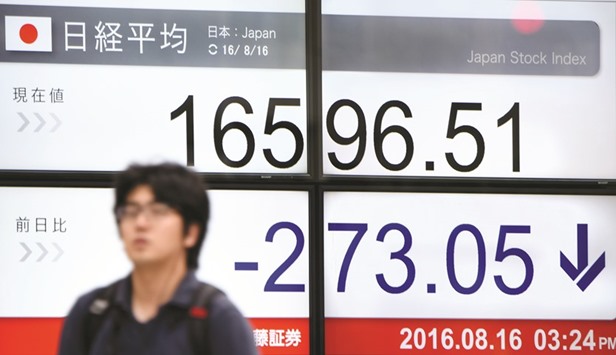Energy stocks rose yesterday after oil prices climbed overnight but most Asian markets sank despite a strong lead from Wall Street.
Tokyo tumbled after a sharp rally in the yen and disappointing growth figures hit sentiment, while Shanghai fell after jumping Monday on hopes a scheme to link trading on the Shenzhen and Hong Kong bourses would be announced soon.
Seoul, Sydney and Bangkok were also down. But bucking the trend were energy shares, which gained as oil prices held above $45 a barrel despite easing in Asian trade. Oil had risen overnight after Russian Energy Minister Alexander Novak was quoted as saying that his country was working with Saudi Arabia to achieve oil market stability.
Refiner JX Holdings in Tokyo rose just over 1%, while Sydney-listed Santos gained 2.5% and Sinopec in Hong Kong added 1.6%.
Mining giant BHP Billiton closed 0.5% higher in Sydney before it reported an annual net loss of $6.39bn, its worst-ever result after being hit by the impact of a fatal mine dam disaster in Brazil and weak commodity prices.
Trading in other sectors was largely subdued. Tokyo fell 1.6% after a rally in the yen against the dollar.
The yen’s rise is a negative for Japanese exporters, making them less competitive overseas and denting profits.
It also came on top of below-par data Monday showing growth in the world’s number three economy was flat during the April-June period.
“The yen is being driven by the dollar’s weakness, spurred by increasing expectations the Federal Reserve won’t raise rates this year,” Nicholas Teo, a strategist at KGI Fraser Securities in Singapore, told Bloomberg News.
“This complicates things for Japanese policy makers seeking to stimulate Japan’s economy. If the Fed doesn’t move this year, there’s a risk of steeper moves next year. That’s very dangerous.”
Chinese markets also fell due to profit-taking. Shanghai and Hong Kong had been lifted in the previous session after the China Securities Regulatory Commission said Friday that the Shenzhen-Hong Kong Stock Connect scheme would be launched this year.
This was in spite of fresh economic data last week that seemed to show slowing growth in the Asian powerhouse.
China launched a landmark “stock connect” between the Shanghai and Hong Kong exchanges in late 2014, which allowed foreign investors to trade selected stocks on Shanghai’s tightly restricted exchange and let mainland investors buy shares in Hong Kong.
In Tokyo, the Nikkei 225 down 1.6% at 16,596.51 points; Shanghai — Composite down 0.5% at 3,110.04 points and Hong Kong — Hang Seng flat at 22,910.84 points at the close yesterday.

A man walks past an electronic stock quotation board in Tokyo. The Nikkei 225 closed down 1.6% to 16,596.51 points yesterday.
